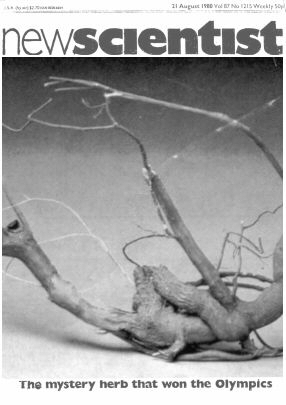
Extract from the shrub Eleutherococcus Improves the mental and physical powers of Soviet athletes, cosmonauts, and workers. Though ignored in the west, the evidence is that the drug really works
Dr Stephen Fulder is a gerontologist with an interest in comparative medicine. His book The Root of Being is published by Hutchinson next word. One drug which Soviet athletes undoubtedly used to increase their performance at the Olympic games this year is a unique material which eludes classification or identification with any established categories of pharmaceutical sub-stances. Despite its extensive use in the Soviet Union for 20 years, authorities in the West know almost nothing about it. For this reason it has not been included in the list of drugs which are banned for international sports events, nor is it in any Western pharmacopoeia. It is an extract of a thorny creeping plant known as Eleutherococcus senticosus, which belongs to the family Araliaceae, the same family as the ginseng root. For this reason it is sometimes erroneously described as "Siberian ginseng". Its arrival on the race track is the culmination of many years of research involving scores of scientists, directed by the USSR Academy of Science's Institute of Biologically Active Substances located in the far eastern science centre at Vladivostok.
Research led to its acceptance as an official medicine by the Health Ministry in 1962 and it now lies in their pharmacopoeia along with a range of toaic drugs derived originally from far eastern traditional medicine, including ginseng, pantocrine and schizandra. The use of Eleutherococcus in sports stems from the discovery that it could increase stamina and performance, XXet had far less side effects than any known stimulant. The derisive test was carried out by Professor I. I. Brekhman, who was director at Vladivostok, and gave Eleutherococcus extract to a large group of athletes before a 10-mile race. Those taking the extract copped some 5 minutes from the time set by others who had taken a placebo. This encouraged Professor A. V. Korobkov to carry out trials with 1500 sportsmen at the Lesgraft Institute of Physical Culture and sports in Moscow. He confirmed that Eleutherococcus could increase endurance, as well as reflexes and concentration, particularly in the longer events. It was especially useful at increasing the amount of training that the athlete could tolerate without harm. The only side effect was an occasional and transient rise in blood pressure.
